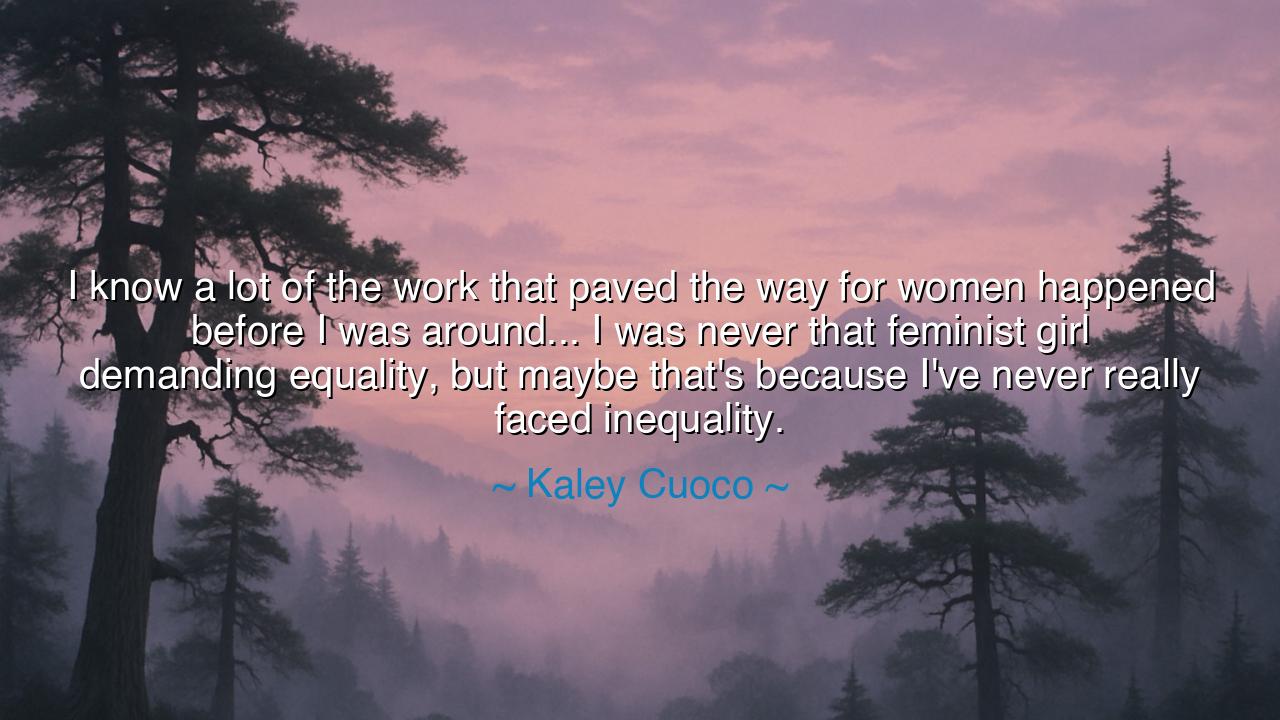
I know a lot of the work that paved the way for women happened
I know a lot of the work that paved the way for women happened before I was around... I was never that feminist girl demanding equality, but maybe that's because I've never really faced inequality.






Hear now, O seekers of understanding, the words of Kaley Cuoco, who once reflected with humility and candor: “I know a lot of the work that paved the way for women happened before I was around... I was never that feminist girl demanding equality, but maybe that’s because I’ve never really faced inequality.” These words, though spoken with gentleness, hold the weight of an age-old truth — that those who live in the light often forget the struggle of those who built the dawn. In them lies both gratitude and revelation: an acknowledgment that comfort is often born from battles fought by unseen hands.
The origin of this saying is not one of rebellion, but of recognition. Cuoco, a woman of success and acclaim, spoke from a place where opportunity seemed natural, where doors stood open not through defiance but through inheritance. Yet her reflection unveils the quiet awareness that such freedom did not fall from the heavens — it was forged by generations who labored and bled for it. She speaks as one who stands on the summit, suddenly turning to glimpse the mountain beneath her feet. Her humility lies in her recognition that while she did not climb every step herself, she walks paths cleared by others.
To the ancients, such awareness would have been called wisdom of gratitude — the knowledge that prosperity unacknowledged becomes arrogance. For in every age, there have been those who mistook inherited privilege for natural order, forgetting the struggle that delivered it. Yet Cuoco’s words do not carry that blindness; they awaken the listener to the cycle of history — that freedom, once taken for granted, begins to wither. When one says, “I have not faced inequality,” the wise must answer, “Then remember those who did, lest you face it again.”
Think, my children, upon the tale of Emmeline Pankhurst, the suffragette who defied kings and courts so that women might one day have a voice in the councils of power. She marched through jeers, endured imprisonment, and faced the world’s scorn — not for herself alone, but for daughters unborn. Or recall Sojourner Truth, who stood before hostile crowds to declare the simple truth of her humanity, proclaiming, “Ain’t I a woman?” These were not voices of comfort but of fire. Their suffering carved the foundations of the equality that modern generations now inhabit, often unaware of the cost. It is to these spirits that Cuoco’s words quietly bow — an unspoken reverence to the architects of freedom.
Yet her statement also reveals a delicate paradox. She admits she has not felt the sting of inequality, and therein lies the proof that the work of feminism has borne fruit. For what greater triumph could those early warriors have hoped for, than for their daughters to grow up in a world where equality feels natural, where injustice seems distant? This, too, is a victory — the peace that comes after a war well-fought. But peace must not breed forgetfulness. When the struggle is forgotten, the rights it won grow fragile. Thus, remembrance becomes duty, and gratitude becomes the armor that guards against the return of oppression.
The wise, therefore, should not scorn Cuoco’s reflection, but embrace its honesty. She speaks for many who live in the comfort of freedom and do not yet see the bones beneath its floor. Her awakening is a reminder to all — that privilege unacknowledged becomes blindness, but gratitude remembered becomes stewardship. To inherit a world shaped by the courage of others is not a reason for shame, but a call to action — to preserve, to protect, and to continue the work of justice in one’s own time.
So, my listeners, take this lesson into your hearts: honor those who fought before you. Do not mock the peace they purchased, nor grow complacent in its shade. Look to the past, not with guilt, but with reverence; look to the present, not with apathy, but with resolve. Wherever you see inequality — whether of gender, race, or station — remember that your voice, too, carries the torch of progress. Speak for those who cannot, and act for those yet unborn. For equality, like a flame, must be tended lest it fade; and gratitude, like wisdom, must be lived, not merely spoken.
And thus, as Kaley Cuoco reminds us, the absence of hardship is itself a gift — one that must never be forgotten. Let us, then, give thanks not only for the freedom we possess, but for the courage that purchased it. For in remembering the fires that forged our peace, we ensure that no darkness can ever again extinguish the light of equality that burns within the human soul.






AAdministratorAdministrator
Welcome, honored guests. Please leave a comment, we will respond soon